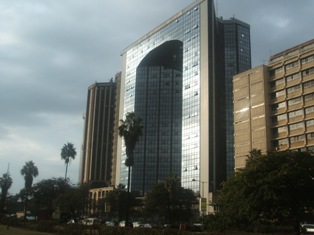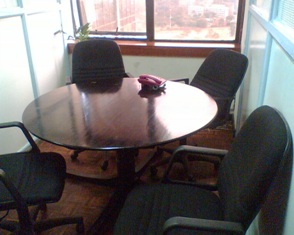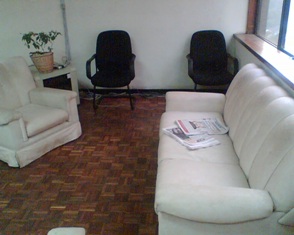“Genius Executive Centre although begun as a subsidized business centre, now operates with the social responsibility of a business incubator” according to Ms. Christine Matogo, acting centre manager. Begun in mid 2005 by SoftLaw, the Centre initially provided fully furnished office workstations with shared lounge, reception and meeting rooms facilities for an affordable monthly fee.
“Over time we realized that the average start-up business requires more than a furnished office at a fancy location,” continues Ms. Matogo. “We turned round the Centre on its heels and began emphasizing on giving our members solid business advice, consultancy services, access to knowledge repositories like LawsofKenya.com, access to investors, and collateral-free loan financing. Our sister business division, Genius Capital & Consulting was initially set up to serve the Centre incubatees with these services at no additional cost. Capital & Consulting now also provides these same services to non-incubatees who have shown great enthusiasm in the products.” Ms. Matogo explains that the Centre acts mostly as a showcase of the services provided by Capital & Consulting which she calls the real cash cow.
The business model for the Centre is a unique one. Although a for-profit organization, the heavily subsidized monthly fee and the free business support services would make one think it is an NGO. Ms. Matogo explains how the Centre achieves this. “When we begun the Centre, we could have chosen to go the way of the existing alternatives at the time and charge exorbitant fees in order to make high margins. Instead we chose to keep the costs low and work on volumes. This ensured the Centre was able to serve its intended clientele. Our targeted clients are business start-ups whose main asset is the skills and knowledge of their owners or staff. Such businesses are service-oriented and use the Centre as a communication and marketing point for their business. Collectively they can be grouped as consultants who specialize in one area or another. To become an incubatee one simply needs to attend an interview and if their business is assessed to have growth potential they are offered a space. The incubatee thereafter needs to pay only K.Shs. 10,000 every 30 days to enjoy the Centre services”
Genius seems to have struck a resonant cord with its targeted clientele, with 75% occupancy in its first month. The Centre is now fully occupied and new members are added to a waiting list. How the Centre ensures that all deserving start-ups get a chance at incubation is by encouraging the growth of its existing incubatees businesses. “Part of being an incubator involves nurturing the growth of the incubatee’s business. We call this graduation and we work with our incubatees to have them graduate within three to six months of joining the Centre. When an incubatee graduates, it means her business has: a strong business and marketing plan, a growing client list, sustainable revenues, a good understanding of cash flow and tight control of its finances as well as a marketable product. Since the Centre begun participating directly in the growth of its incubatees businesses we have had over thirty graduates.”
The concept of business incubators is not new, but unlike most incubators that rely on donor support or government backed funding, Genius is a self-sustaining business albeit with low margins. Ms. Matogo explains that the Centre is more of corporate social responsibility effort than a money making venture. “The founders of the Centre decided to set up an incubator based on their own hardships and frustrations when starting their business. It was an effort at giving back to the community, but the Centre has been stringently managed to ensure that it can sustain itself financially. The Centre serves a social function as well as to advertise Capital & Consulting’s products to non-incubatees. When non-incubatees see the success of our incubatees they seek out Capital & Consulting to benefit from the same services.”
The future of Genius is bright. With a strong understanding of nurturing and developing small businesses SoftLaw’s plan for the future is to concentrate fully on the financing and consulting arm, Genius Capital & Consulting. “A plan is already in motion to remove the monthly fee for incubatees altogether, explains Ms. Matogo . We intend to provide offices at no cost to deserving start-ups who will undergo an interview to determine the viability of their business. We will also share in their risk by becoming equity partners through buying of shares in their companies. Our belief is that simply providing offices is not a sustainable business. The motto at Genius is ‘our business is your business’. We intend to put all our resources, skills, human capital and finances in facilitating the establishment and growth of innovative Kenyan companies.”





Comments
Good work here, been researching incubators and here am I.
Genius is great place but I think 10k a month locks out a lot of potentials don't you think?
Boss.
Thanks for the comments. At GEC we're always looking out for ideas to do even more to incubate startups. Lowering the cost is definitely one way, I'd love to hear any ideas you have on the same.
Harry
My idea is an incubator with an option of allowing teams, say 2 persons per workstation. Then the location does not have to be fancy, just an accessible location in town which will keep overheads low. Again internet access could be optional for non-tech biz.
All this for about 5k a month I think would go a long way in reaching out to more potential startups
Boss
Boss
The incubator idea is great. i was wondering if you would support a micro finance business. i intend to grow into an investment company but my finances are limited.
Naomi
i am a u.s. retired cpa and i did volunteer business training for a the k-rep microfinance program in kakamega from may 2006 through septmeber 2006. i discovered that each of the several mfi's in kakamega did their own business training for clients but on a very infrequent and limited basis. i am researching the idea of pursuing a grant to start low tech business incubators in town like kakamega that would provide business training to all mfi clients, as well as one-on-one business counseling, access to internet, etc. this is not a profit venture of course. i would like to have your input on whether the concept would be needed and welcomed by the mfi's whose clients with very low income. thanks
How is your incubator idea coming along? I think your idea is very salable. Quite a number of prospects at GEC have inquired about something similar. Leaving the option of the internet is important. Perhaps you can have an internet room with about 1 computer for every 5 members. To prevent hogging of the internet you can have the members book to use the room during peak hours. Maybe have a free for all at off-peak hours. Keep us posted how its going.
How's your business coming along? I'd be willing to sit with you and see what financing options there are for your business. Drop me an email at harrykaranja@yahoo.com.
Seeing that you are into investments check out BetOnStocks
I'm not too sure about the viability of your idea but I know that pushing technology to the rural areas is a key focus of the government right now. Here is something I received in my inbox which might be of interest to you.
The Ministry of Information and Communications, in association with
ICTvillage.com, has organized an ICT Development Expo focusing on ICT for Rural Development. This Expo will be held at the Kenyatta International Conference Centre from 7th to 10th February 2007 and will incorporate the following events:
International Exhibition - to display ICT products and solutions.
Development Arcade - to showcase rural ICT projects and programs.
Leaders Conference - for public and private sector leaders.
Grassroots Conference - for reps from each constituency.
Business Day - for entrepreneurs seeking rural ICT opportunities.
Students Day - for secondary, college, and university students.
The objective of the Expo is to create demand for rural ICT development. After the Expo, there will be an ICT Roadshow to help interested parties to set-up digital villages or e-centres in each constituency in Kenya.
Your organization can participate in the Expo by choosing a stand or tent to exhibit your products or projects. You can also participate by attending the Leaders or Grassroots Conference. Please do not hesitate to contact us for more information.
Happy New Year!
Kate Aloo
Expo Coordinator.
PS - The latest ICT Village Magazine (Jan-Feb 2007) is now available.
Contact us for an annual subscription delivered to your office:
Personal Subscription - 1 copy every 2 Months - KShs. 1,500/-.
Corporate Subscription - 5 copies every 2 Months - KShs. 7,500/-.
-------------------------------------------
ICTvillage.com,
Idea Factory Limited,
The Office Park,
Riverside Drive.
Tel: 254-020-444-9277
254-020-444-7655
Fax: 254-020-444-9210
PO Box 12 - 00606,
Sarit Centre,
Nairobi, Kenya.
weitloss@yahoo.com